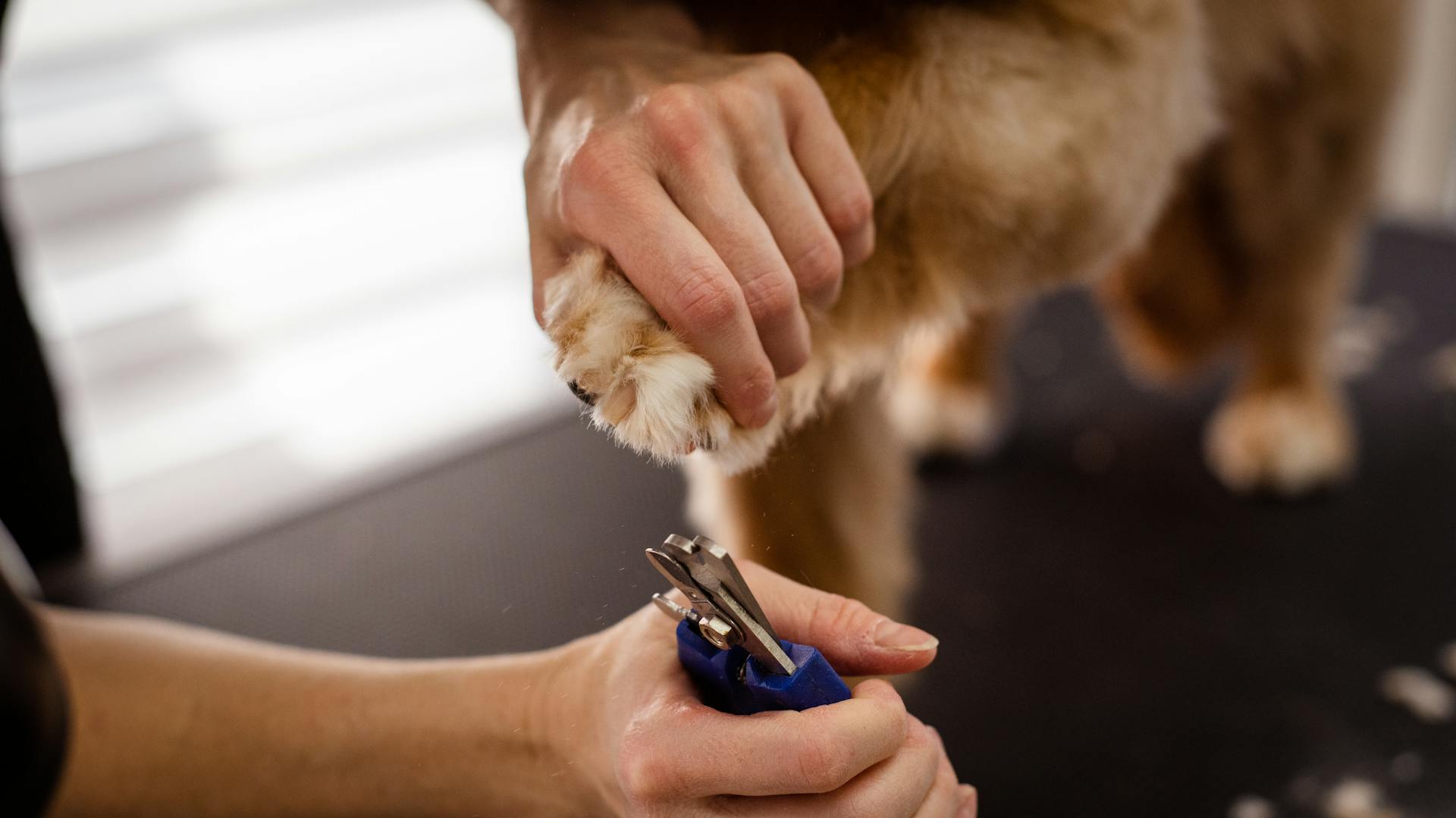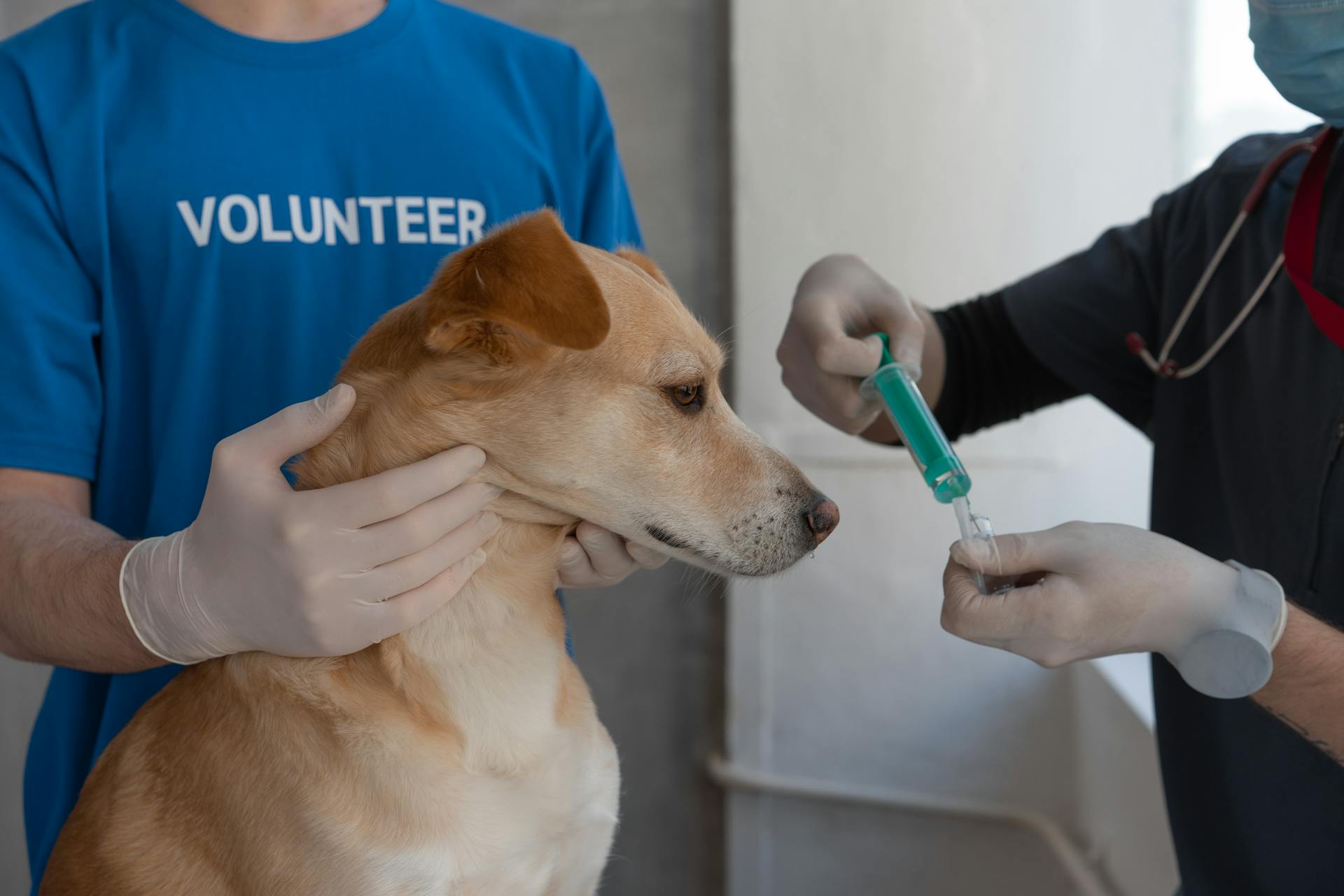
Getting a sheepadoodle puppy is a big decision, and it's essential to know what to expect. Sheepadoodles are a cross between an Old English Sheepdog and a Poodle, making them a unique and lovable breed.
Sheepadoodles are known for their intelligence and trainability, which means they can learn quickly with positive reinforcement. They thrive on interaction and mental stimulation.
To bring a sheepadoodle puppy home, you'll need to plan for regular grooming sessions, as they require regular brushing to prevent matting.
What is a Sheepadoodle?
A Sheepadoodle is a delightful mix of an Old English Sheepdog and a Poodle, known for being brainy, affectionate, and having coats that are great for allergy sufferers.
They're a clever cross between two breeds, and their emotional intelligence is off the charts, making them incredible therapy dogs.
Sheepadoodles are usually medium to large in size, with fluffy, curly fur that needs regular TLC.
Their coats are one of their best features, but they do require some extra attention to keep them looking their best.
Sheepadoodles have a classic "shepherd" personality – protective of their family and a bit reserved with strangers.
But don't let that fool you, they're bundles of affection for their loved ones, and they thrive on love and attention.
They're smart cookies, easily trainable and capable of learning tricks and tasks.
Sheepadoodles are fantastic with kids and other pets, making them a great addition to many families.
However, they do need mental and physical stimulation to keep them content, so an active household is a must.
It's also worth noting that Sheepadoodles may show possessive behaviors, but with early training and positive reinforcement, this can be easily addressed.
Appearance and Size
Sheepadoodles tend to inherit the patchwork of black and white markings from their parents, giving them a distinctive appearance that's often compared to a panda. This coloring can sometimes fade into gray as they age.
They can also have a more poodle-like domed head or a square face like an Old English Sheepdog, depending on which parent they take after. On rare occasions, a Sheepadoodle will have a red and white coat instead of the more common black and white.
Sheepadoodles come in a range of sizes, from 20-100 pounds, with the average standard size being 50-85 pounds. They can be as small as 45 pounds or as large as 100 pounds.
Their coats can be straight, wavy, or curly, and they may have a black patch over one or both eyes. Most Sheepadoodles are considered hypoallergenic, though some breeders prefer to call them "relatively hypoallergenic" due to the OES genes.
Size
Sheepadoodles come in a range of sizes to suit different lifestyles. The average standard Sheepadoodle weighs between 50-85lbs.
You can expect a Small Standard (moyen) Sheepadoodle to weigh between 35-60lbs, with an average of around 45-50lbs. This size is perfect for those who want a medium-sized dog.
Mini Sheepadoodles are a cross between a Miniature Poodle and an Old English Sheepdog or Sheepadoodle, and they weigh between 30-50lbs. This size is ideal for those who want a smaller dog.
The smallest size of Sheepadoodle available is the micro Sheepadoodle, which can weigh as little as 20lbs.
If this caught your attention, see: Sheepadoodle Mini Size
Coat Colors and Patterns
Sheepadoodles are often born with a combination of black and white colors, which can give them a panda-like appearance.
Their coats can vary significantly as they age, with the black often fading to shades of gray. Some black spots may even clear to white over time and disappear entirely!
Sheepadoodles can have a range of coat patterns, including tuxedo markings, abstract spots, polka dots, and patch eyes. They can also have parti faces, masks, and other unique markings.
Their coats can range from straight to curly hair, and often there is a variety within one litter. Some Sheepadoodles can have a coat similar to the straight, fluffy hair of the Old English Sheepdog, while others can have kinkier hair like a Poodle.
Most Sheepadoodles are considered hypoallergenic, although some breeders prefer to call them "relatively hypoallergenic" due to the Old English Sheepdog genes.
Broaden your view: English Water Spaniel
Temperament and Personality
Sheepadoodle puppies are known for their friendly and outgoing nature, making them perfect for families with children and other pets. They're highly social and love being part of family activities.
One of the most notable traits of sheepadoodles is their intelligence - they have a high emotional IQ and are known to be very bright. This makes them highly trainable and eager to please their owners.
Sheepadoodles are also incredibly playful and enjoy a bit of roughhousing, which makes them a great match for families with kids who love to play. They're not high-energy dogs, but they do have incredible endurance and need plenty of exercise and mental stimulation to keep them happy and healthy.
As Stacy Choczynski Johnson, DVM, notes, sheepadoodles can inherit different traits from their parents, which can result in a wide range of personality traits. However, they're generally wonderful family dogs that love attention and children.
Here are some key characteristics of sheepadoodles:
- Very bright and intelligent
- Highly social and love being part of family activities
- Playful and enjoy roughhousing
- Excellent family dogs that love children
- Need plenty of exercise and mental stimulation
Overall, sheepadoodles are friendly, intelligent, and a little goofy - making them perfect for families who want a loving and playful companion.
Living Needs and Care

Sheepadoodle puppies thrive in active households with regular exercise, so be prepared to bring them on runs, neighborhood walks, and hikes through the woods.
Their thick coats make them excellent dogs for cold-weather climates, but in warmer climates, owners can trim their fur shorter and ensure they have cool indoor spaces with plenty of water.
Sheepadoodles enjoy the company of other dogs and taking part in playtime at dog parks, but owners should keep an eye on them to prevent herding small animals and children.
Regular exercise is vital for their overall health and wellbeing, and owners can use a ball launcher for a good game of fetch or take them on a playdate in a fenced yard to socialize and stretch their legs.
If you live in an apartment, be ready to provide your sheepadoodle with regular exercise to keep them satisfied, and consider using a doggy day care or a dedicated walker if you have to leave them home alone for long hours.
Sheepadoodles become attached to their families and can develop separation anxiety if left alone for too long, so start training them right away with positive reinforcement techniques to help them feel comfortable with small periods of time away.
A different take: Small Puppys
Living Needs

Sheepadoodles are active dogs that require regular exercise to stay healthy and happy. They thrive on activities like running, walking, and hiking with their owners.
A ball launcher is a great way to burn off energy, and many Sheepadoodles love playing fetch. However, their thick coats make post-swimming cleanup a hassle, so it's best to stick to land-based play.
Sheepadoodles are excellent companions for outdoor activities and can even enjoy the company of other dogs at dog parks. But, be aware that their herding background might lead them to try rounding up small animals and children, so keep a close eye on them.
Their thick coats also make them well-suited for cold-weather climates, but in warmer climates, owners can trim their fur a bit shorter to keep them cool.
Care
Sheepadoodles are a great fit for people with allergies because of their low-shedding coat. They require regular grooming to keep their coat in great condition.
For another approach, see: Flat Coat Doodle

You'll want to brush your Sheepadoodle frequently during the week and have them bathed and trimmed every 8-12 weeks. Don't forget to clean their ears regularly of wax and debris and trim their nails.
Sheepadoodles can develop separation anxiety if they're left alone for too long, so it's essential to start training them right away. Positive reinforcement training can help them feel more comfortable with small periods of time away from you.
As with any breed, it's crucial to start training your Sheepadoodle with the adult dog in mind. Don't allow or encourage your puppy to do anything you wouldn't want a 90-pound Sheepadoodle doing a year from now.
Their thick coats make them excellent dogs for cold-weather climates, but in warmer climates, their owners can trim their fur a bit shorter to keep them cool.
For another approach, see: Sheepadoodle Training
Health and Wellness
Sheepadoodles are generally a healthy breed with a lifespan of 12-15 years.
They can be prone to certain health conditions, but regular vet check-ups and a balanced diet can help keep these issues at bay.

Hip dysplasia and eye conditions like progressive retinal atrophy are some common concerns.
Regular grooming is essential to prevent matting and tangles, and weekly brushing is recommended.
Sheepadoodles can be prone to eye conditions, so keep tabs on your pup's eyes and talk to your vet right away about any changes you notice.
Feeding your Sheepadoodle in a food puzzle or maze can help slow down eating and prevent stomach bloat, a condition that can be life-threatening in large dogs.
It's essential to discuss your puppy's health with your breeder and vet, especially since both Old English Sheepdogs and Poodles can be prone to conditions like hip dysplasia and hypothyroidism.
Regular vet visits, proper diet, and exercise can help your Sheepadoodle live a maximized healthy life.
Coat Maintenance Overview
Sheepadoodle puppies are known for their adorable, low-shedding coats. This is a big plus for people with allergies or who want to avoid dog hair in their homes.
Regular brushing is essential to prevent matting and tangling in their fur. You'll want to brush your Sheepadoodle at least once a week, but ideally 2-3 times a week or even daily if you want to keep their coat looking its best.
Sheepadoodles require routine grooming to keep their hair trimmed, neat, and free from matting. This includes regular ear cleaning to prevent dirt, moisture, and earwax buildup.
You can either learn to groom your Sheepadoodle yourself or take them to a professional groomer. Either way, regular grooming is crucial to prevent coat problems and keep your dog comfortable.
Here's a rough outline of what to expect in terms of grooming frequency and cost:
- Bath and trim every 6-8 weeks: $90-$120
- Bath alone every 3 weeks: $50-$70
- Regular brushing and ear cleaning at home: priceless, but essential!
Keep in mind that Sheepadoodles can be prone to seasonal shedding, so be prepared for some extra grooming during certain times of the year.
Behavior and Training
Sheepadoodle puppies are known to nip more than other breeds due to their herding instinct, but with consistent training, it's possible to break the habit. This behavior is not actual biting and is more of a natural instinct to keep their sheep in line.
Redirecting your puppy's attention with bully sticks to chew on is a basic method of defense. Consistently not allowing nipping from the beginning is your best bet, and when they stop teething, they will likely stop nipping as well.
Herding is a common characteristic of Sheepadoodles, inherited from their Sheepdog lineage. You can't train this natural instinct out of them, but you can teach them to control it.
Learning basic commands like sit and stay is a great first step to controlling their herding instinct. Stop the herding before it begins by intervening sternly when you see the dog wanting to herd.
Sheepadoodles are highly motivated and intelligent dogs that love to learn and work. They thrive on positive reinforcement training techniques and require mental stimulation to prevent boredom.
A Sheepadoodle's high-energy levels require regular exercise to keep them happy and healthy. Activities like fetch, long walks, and swimming are great ways to keep them engaged.
Here are some tips for training your Sheepadoodle:
- Redirect their attention with bully sticks to chew on
- Consistently not allow nipping from the beginning
- Stop the herding before it begins
- Teach basic commands like sit and stay
- Provide regular exercise and mental stimulation
With patience, consistency, and positive reinforcement, you can help your Sheepadoodle become a well-behaved and happy member of your family.
Puppy Nutrition
Feed your Sheepadoodle puppy a large-breed puppy food to ensure best bone health. This is especially important for large-breed puppies that have slower bone growth.
Choose a food appropriate for your dog's life stage as they grow. This will help ensure they get the right nutrients at the right time.
Create a feeding schedule with three or four mealtimes before switching to twice a day when your dog reaches adulthood. This will help your puppy develop a healthy eating habit.
Feed your dog multiple small meals throughout the day, rather than one large meal, if they're at a high risk for GDV. This will help reduce the risk of this serious health issue.
Take care not to overfeed your Sheepadoodle, as they can still become overweight even as a large breed. Monitor your dog's body size and composition throughout life to ensure they're getting the right amount of nutrition.
Here's a general guideline to follow: consult the measurement guidelines on the label of an AAFCO-approved food and pay close attention to your dog's body size and composition.
Recommended read: Puppys Food
Owning a Pet
Owning a Sheepadoodle can be a wonderful experience, but it's essential to consider the unique needs of this breed. They require a lot of attention and exercise, and their large size means they need plenty of space to move around.
Their social nature makes them perfect for families, but they can get destructive if left alone for too long. If you have a full-time job, a Sheepadoodle might not be the best fit.
Sheepadoodles are intelligent and easy to train, which makes housebreaking a breeze. They're also highly emotional, so they pick up on their owner's feelings quickly.
Their grooming needs are considerable, with regular upkeep required to prevent matting. This can be expensive, especially if you have a larger Sheepadoodle like Zion, who weighs around 75 pounds.
Sheepadoodles are great with kids, but their large size means they can be difficult to manage for younger children. They also have a strong herding instinct, which can be challenging to train out.
Here are some key pros and cons to consider:
- Extremely social and loving
- Smart and easy to train
- Emotionally intelligent and great with families
- Hypoallergenic and low-shedding
- Great temperament and long lifespan (12-15 years)
- Affectionate and playful
- Require a lot of attention and exercise
- Expensive grooming needs
- Strong herding instinct
- Nipping and chewing issues
Sheepadoodle with Family and Other Animals
Sheepadoodles are natural playmates for kids and other animals. They love to play with children and are often considered a big, fluffy stuffed animal come to life.
Their calm demeanor makes them an excellent match for families with young children. They're very gentle and will take a child's rougher play with little to no reaction.
Sheepadoodles also love playing games with kids and will enjoy burning off energy by running around and playing with their little humans. This playfulness is a trait of Sheepadoodles and why many families are attracted to them.
However, it's essential to remember that Sheepadoodles can inherit the herding tendency of their Old English Sheepdog parent, which may cause them to nip at children. This behavior is most common in puppies under age 2 and can be removed through proper training and reinforcement.
Parents with young children should understand this propensity so they and their children can know what the puppy is doing and respond in a way to discourage the behavior. With training, Sheepadoodles should quickly learn that this behavior is discouraged.
Sheepadoodles also get along excellently with other dogs and will enjoy having doggie siblings. In fact, most dogs do best when you have two or more in a home, as they are pack animals.
Sheepadoodle Growth and Longevity
Sheepadoodles can grow to be quite large, with the standard size ranging from 50-80lbs, depending on the size of their parents.
They can also be bred in medium and toy size, making them a versatile breed for different families.
If you're considering bringing a Sheepadoodle into your family, be prepared for a lifelong commitment, as they have a lifespan of 12-15 years.
With proper care and attention, your Sheepadoodle can be a loving family member for years to come.
Puppy Growth
Puppy growth is an exciting but challenging time for Sheepadoodle owners. The standard Sheepadoodle dog is between 50-80lbs, depending on the size of the parents.
Sheepadoodle puppies can be bred in medium and toy size, which means their growth rate and adult size can vary. In our experience, it's like having a toddler again - they want to play all day every day, but they don't know the rules yet!
To ensure healthy growth, consider your dog's size and activity when choosing a dog food. Brown-Bury recommends feeding your Sheepadoodle puppy a large-breed puppy food.
Expand your knowledge: Sheepadoodle Weight Calculator

Here's a rough estimate of what to expect in terms of size:
As your dog grows, choose a food appropriate for their life stage. And don't forget to feed them twice a day, with multiple small meals throughout the day if they're at a high risk for GDV.
How Long Will They Live?
Sheepadoodles have a relatively long lifespan, with an average life expectancy of 12-15 years.
They can be a loving family member for a long time, providing companionship and joy to their owners.
Their lifespan is comparable to that of other popular breeds, and with proper care and attention, they can live a happy and healthy life.
With regular veterinary check-ups and a balanced diet, Sheepadoodles can reach their full potential and enjoy many years with their families.
You might enjoy: Mini Sheepadoodle Lifespan
Sheepadoodle for Sale
If you're looking for a Sheepadoodle for sale, you've come to the right place. Our Sheepadoodles are carefully bred for health, temperament, and beauty.
They're a delightful combination of the gentle and intelligent Old English Sheepdog and the loyal and affectionate Poodle. These medium-sized doodles are sure to turn heads wherever they go.
Our Sheepadoodles are medium merle doodles, offering a unique coat pattern that's both beautiful and eye-catching. They're perfect for families or individuals looking for a loving companion.
They're available for sale in Wisconsin, making it easy to find and bring home your new furry friend. Whether you're looking for a family companion or a furry friend for your daily adventures, our Sheepadoodles are the perfect choice.
You might enjoy: Medium Sheepadoodle
Frequently Asked Questions
What is the downside of Sheepadoodles?
Sheepadoodles require regular social interaction and can develop anxiety and depression if left alone for extended periods. They may exhibit destructive behavior if their social needs are not met.
How much does a Sheepadoodle puppy cost?
The initial cost of a Sheepadoodle puppy can range from $150 to $3,000, while ongoing monthly expenses typically fall between $50 to $295. Learn more about the total costs of owning a Sheepadoodle.
Are Sheepadoodles good house dogs?
Sheepadoodles make great family pets, but they do require some extra care due to their large size and energetic nature. They thrive in homes with adults and children who can provide gentle guidance and playtime.
Why are Sheepadoodles so expensive?
Sheepadoodles can be pricey due to factors like breeder reputation, location, and lineage, which impact their initial purchase price. Ongoing expenses, such as food, grooming, and veterinary care, also contribute to their overall cost.
How long can you leave a Sheepadoodle alone?
Sheepadoodles require attention and exercise, so it's best to leave them alone for no more than 8 hours to prevent boredom and behavioral issues. Leaving them alone for 12 hours can be detrimental to their well-being.
Featured Images: pexels.com


